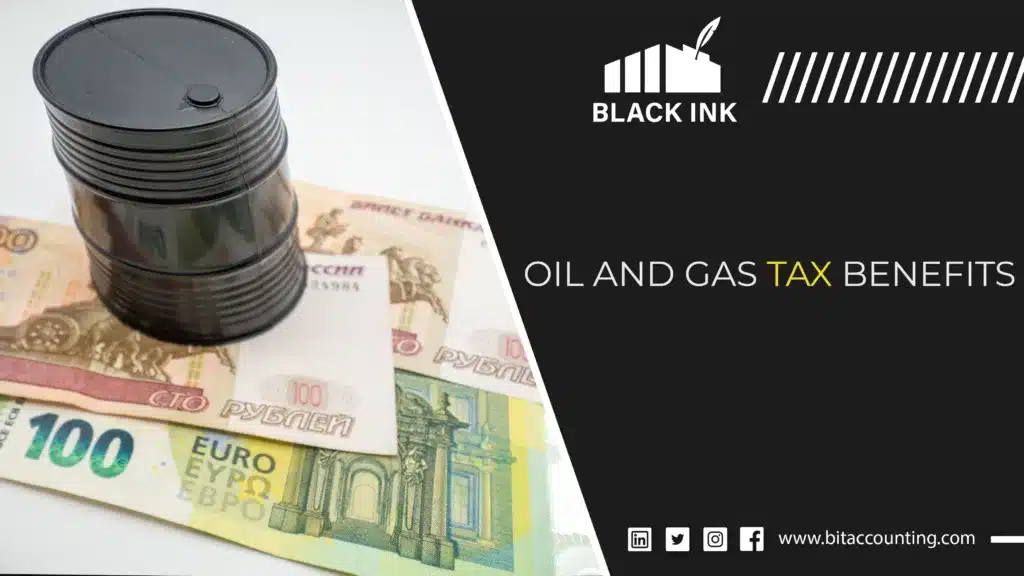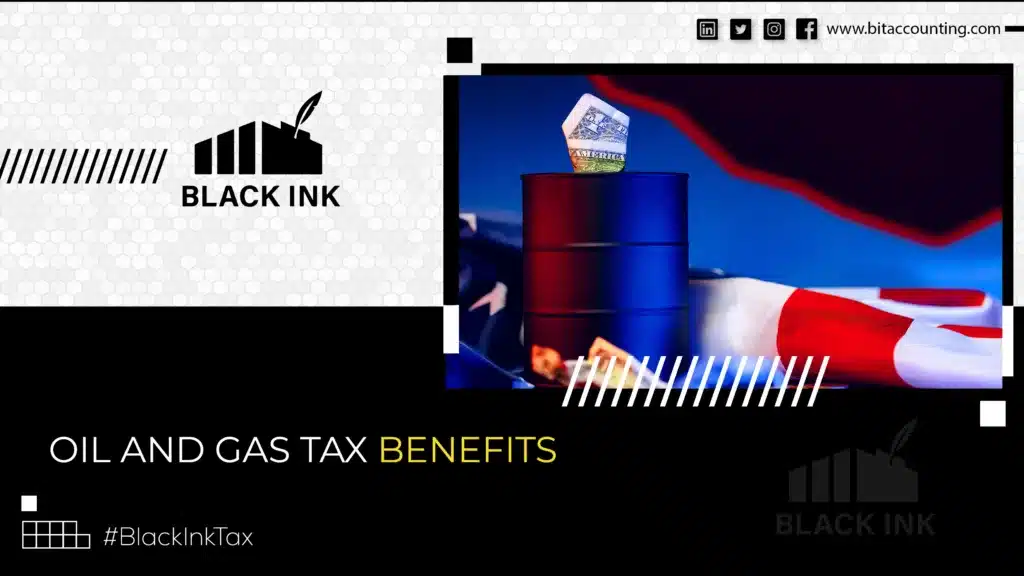
Table of Contents
Oil & Gas Investment Tax Benefits 2025: Maximize Deductions
Let’s be honest—when you think about the IRS, you’re probably not thinking “generous.” You’re thinking receipts, audits, and why your refund ghosted you. But here’s the twist: when it comes to oil and gas investments, the tax code actually shows some love.
Yes, Uncle Sam plays favorites, and oil and gas investors are absolutely one of them. These aren’t some shady backdoor deductions. These are real, IRS-approved, built-into-the-tax-code benefits for anyone investing in U.S.-based energy production.
Let’s walk you through how it works, why it’s so tax-efficient, and why more investors aren’t talking about it (yet). Because if the IRS is handing out benefits… why not take them?
What Exactly Are Oil and Gas Investments?
Oil and gas investments are, at their core, money you put into businesses or projects that explore, extract, and produce crude oil or natural gas. But the way you invest can vary wildly.
Some people buy stocks in public oil companies. Others go deep into direct participation programs (DPPs) where you actually own a piece of the drilling operation. There are also royalties, working interests, and partnerships that put you closer to the action.
The closer you get to the wellhead, the juicier the tax benefits. And that’s not by accident—it’s because the government wants more domestic production and is willing to reward investors with substantial tax breaks to make it happen.
How Investing in Oil & Gas Can Help Lower Your Tax Burden
Here’s the real kicker: oil and gas investments offer some of the most aggressive tax benefits allowed under U.S. law. And they kick in almost immediately.
So how do they help you save?
- Intangible Drilling Costs (IDCs): You can deduct 60-80% of your investment right away. That’s not an exaggeration. These are the non-physical expenses like wages, site prep, and surveys.
- Tangible Drilling Costs: The remaining investment—used on equipment—can be depreciated over a 5–7-year period.
- Depletion Allowance: Once the well produces, you can deduct a percentage of the oil sold as if the resource itself is being “depleted.” It’s basically a reward for selling something that can’t be replaced.
- Small Producer Tax Exemption: This one’s for independent investors. If you meet certain criteria, you could exclude 15% of your gross oil and gas income from taxation.
- Active Income Status: Unlike real estate and other passive ventures, working interests in oil and gas are considered active income, meaning you can use those losses to offset your regular W-2 earnings.
It’s like the tax code put on a cowboy hat and decided to ride for investors instead of against them.
Examples of Oil and Gas Tax Benefits in Action
Let’s make this real.
You invest $100,000 into a working interest.
- Around 70% of it—$70,000—goes to intangible drilling costs, and you get to deduct it immediately.
- The remaining $30,000? You depreciate it over a few years as tangible assets.
- If the well hits and produces income, you might get a 15% depletion allowance, meaning 15% of that income won’t be taxed.
- And if you’re considered an active participant (most direct investors are), those deductions can be used to offset your other active income.
Compare that to mutual funds or real estate where you’re waiting for paper losses, interest write-offs, or maybe some passive credits. Oil and gas? The tax relief hits fast and hard.
Why Isn’t Everyone Investing in Oil and Gas If It’s So Tax Advantaged?
Good question. The simple answer? Risk.
Oil and gas investing isn’t the safe, slow-and-steady game like index funds or real estate. Wells can be dry. Projects can fall apart. Oil prices can tank overnight. It’s volatile. It’s unpredictable.
Also, these investments typically require accredited investor status, meaning you need a solid income or net worth to even get a seat at the table.
Plus, many investors just don’t understand it. It feels niche, complex, and messy. That’s where services like BitAccounting come in—to help demystify it and make sure you’re not missing out on one of the most underutilized tax strategies in the market.
Understanding Year-End Tax Benefits for Oil and Gas Investments
Now here’s where it gets spicy.
Year-end investing in oil and gas is one of the most effective ways to slash your tax liability before the ball drops on December 31st.
Let’s say it’s December 15th. You know your income is going to be high this year. You also know you’re going to owe a painful amount in taxes.
You drop $150,000 into a DPP oil investment before December 31. Immediately, up to 80% of that could be deducted, right on your 2025 return. You get the tax benefits this year, and the income from production next year.
That’s what smart investors call a win-win.
Maximizing Year-End Tax Benefits in Oil and Gas
To get the most out of it:
- Invest Before the Deadline: These deductions only count if the investment is made before year-end.
- Work With a Pro: Seriously, don’t DIY this. Partner with tax advisors or firms like BitAccounting that understand the tax code down to the decimal.
- Choose the Right Structure: The tax treatment depends on the type of investment. Working interests, partnerships, and royalties all behave differently.
And remember, timing is everything. One week too late and the deductions vanish until next year.
Oil Tax Breaks and Energy Infrastructure Development
These breaks aren’t just investor candy—they fuel the entire energy ecosystem. By encouraging private money to flow into oil and gas, the government stimulates energy independence, infrastructure growth, and job creation.
It’s one of the rare moments where the investor’s tax advantage also contributes to national interests.
Intangible Drilling & Development Cost Tax Deduction
These are expenses that aren’t tied to physical assets—think engineering, surveys, labor, etc. The IRS lets you deduct them immediately, and they often make up the largest portion of your investment.

Tangible Drilling & Development Cost Benefits
Think rigs, storage tanks, casing—anything you can touch. These are depreciated over time, generally using the Modified Accelerated Cost Recovery System (MACRS).
Small Producers Tax Exemption
If you’re not ExxonMobil and your production is under certain thresholds, you may qualify to exclude 15% of your gross income from oil and gas from taxation. That’s no small deal.
Active vs. Passive Income
This is where oil and gas really flips the script.
Most investments are passive. You earn, you pay, you move on. But in oil and gas, if you’re a general partner or have a working interest, your income and losses count as active.
That means those juicy deductions? They can offset your day job’s W-2 wages or other active income.
Oil & Gas Investments Are Not Passive Income
Let’s repeat that—not passive. That means losses from your oil investments can cancel out your salary, giving you a shot at a smaller tax bill in April.
Investment Options in Oil and Gas
Not all oil investments are the same. Here’s what’s out there:
Mutual Funds
Lower risk, lower reward. No direct tax perks—just market exposure.
Partnerships
More risk, but this is where the real tax advantages live. Most direct investments fall here.
Royalties
Get a cut of the income without the risk of operating.
Working Interests
High reward, high risk. You’re on the hook for everything—but you also get the full buffet of tax perks.
Why Are Oil and Gas Partnerships Attractive to Tax-Savvy Investors?
Because they combine potential income with massive front-loaded tax deductions. You’re in a business that earns while you sleep, and it’s backed by a tax code that favors production.
Partnerships allow you to:
- Deduct expenses upfront
- Claim a share of depletion
- Receive active income treatment
- Defer tax with cost depletion over time
It’s a dream combo for high-income earners looking to shelter income from the taxman.
How Oil Tax Benefits Work
It all boils down to this: the U.S. government needs domestic energy, and they’re willing to pay you in deductions to support it.
Where Do the Tax Benefits Come From?
They stem from long-standing provisions in the tax code meant to encourage energy independence. These include:
- Section 263(c) for IDCs
- Section 611 for depletion
- MACRS rules for depreciation
- Section 613A for small producers
It’s all legal, transparent, and designed to reward risk.
Net Revenue Interest (NRI) and Oil Taxation
This is your cut of the profits after everyone else gets paid—royalties, expenses, and taxes. Knowing your NRI is crucial because your tax is based on it, not the gross revenue.
Lease Costs
Lease acquisition isn’t deductible upfront, but it’s considered a capital investment and can affect your basis in the investment, impacting gains later.
Alternative Minimum Tax (AMT)
Heads up: some deductions (like IDCs) could trigger AMT if you’re in a higher bracket. This is where having a firm like BitAccounting is essential—they help you plan around it, not walk into it blind.
Bottom Line
Oil and gas investments aren’t for the faint-hearted—but if you’re in a high-income bracket, looking to slash your taxes, and have the stomach for a bit of volatility, this is a powerful and often overlooked strategy.
When done right (and with proper accounting), these investments can do more than just grow your wealth—they can revolutionize your tax bill.
Want to explore this the right way? Talk to the experts at BitAccounting who know exactly how to structure, report, and maximize your oil and gas investments.
FAQs
1. Are oil and gas investments legal tax shelters?
Yes, they’re fully legal and written into the tax code to encourage energy production.
2. Can I offset my W-2 income with oil and gas losses?
Yes—if you’re involved in a working interest.
3. What are intangible drilling costs?
Non-physical expenses like labor and site prep. Mostly deductible immediately.
4. Do I need to be an accredited investor?
For direct investments like partnerships—yes.
5. What’s the difference between royalties and working interests?
Royalties earn you income without operations involvement; working interests give full tax perks.
6. Can I invest before year-end for immediate deductions?
Absolutely. That’s one of the top year-end tax strategies.
7. Will this trigger AMT?
It might. That’s why a skilled tax team matters.
8. How is NRI different from gross revenue?
It’s your take-home after everyone else’s cut.
9. Do lease acquisition costs get deducted?
Not immediately, but they impact your basis.
10. Where can I get help planning this?
Right here: BitAccounting—they’ll break it down like your financial translator.
GET FREE QUOTE FOR ALL OF OUR SERVICES
Black Ink will send you a free analysis of your current state and what would be the cost of managing either a separate accounting and bookkeeping services or a complete solution across New York, USA. Do get in touch and we will be happy to consult you with our bookkeeping services in NY, New York, USA.
